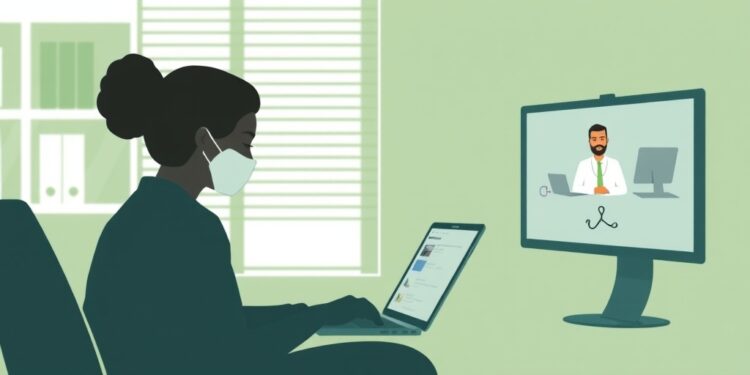
In a recent cohort study, researchers investigated the rapid adaptation of telemental health care among Medicaid beneficiaries with schizophrenia during the COVID-19 pandemic. The findings shed light on how pandemic-induced changes in healthcare delivery have particularly impacted vulnerable populations, including individuals with serious mental health conditions. The study highlights significant disparities in the diffusion of telemental health services based on racial and ethnic backgrounds, indicating that these demographic factors play a crucial role in the accessibility and effectiveness of mental health care.
Historically, mental health services have faced barriers that disproportionately affect marginalized communities. This study reveals that, following the onset of the pandemic, many state-operated health agencies embraced telemental health care as a means to ensure continuous care delivery amid social distancing restrictions. The researchers noted that the transition to virtual care was accelerated due to emergency measures, leading to an unprecedented increase in the utilization of telehealth services. This rapid diffusion raises important questions about equity and access within the healthcare system.
The results of the study indicate that while there was a general increase in the acceptance of telemental health care, the benefits were not uniformly distributed. Specifically, the data revealed within-agency inequalities in uptake based on race and ethnicity, suggesting that systemic biases could persist even in a rapidly evolving healthcare environment. Such disparities underline the necessity for policymakers to actively monitor and address these inequities in order to ensure that innovations in mental healthcare reach all populations effectively.
Moreover, the study emphasizes the importance of ongoing research to assess longitudinal trends in telemental health utilization. Understanding these trends will be critical for designing interventions that aim to close the gaps identified in the study, particularly for communities of color and other underrepresented groups. The findings suggest that tailored approaches may be needed to enhance the accessibility and acceptability of telemental services among diverse populations, which could lead to better health outcomes in the long run.
Additionally, the study points out the need for healthcare providers to receive appropriate training in cultural competence, which is necessary to deliver sensitive and relevant care to individuals from different backgrounds. This could facilitate better communication and trust between providers and patients, thereby improving the overall effectiveness of telemental health care. The importance of being responsive to cultural nuances cannot be overstated, as understanding specific community needs can significantly impact treatment adherence and outcomes.
Given the ongoing challenges posed by the COVID-19 pandemic, the potential for telemental health to transform service delivery for individuals with schizophrenia presents both opportunities and challenges. On one hand, telemental health can significantly reduce barriers to access, such as travel times and costs, while also allowing for more flexible appointment scheduling. On the other hand, care must be taken to recognize and mitigate the factors that deter some individuals from utilizing these services, including access to technology and the digital divide.
This study serves as a crucial reminder that innovation in healthcare must be accompanied by a conscious effort to maintain equity in access. As healthcare delivery continues to evolve in the post-pandemic world, it will be imperative for state agencies and health organizations to iteratively assess the impact of their programs. Efforts should focus on strategizing methods to enhance telemental health service adoption across diverse racial and ethnic groups.
Furthermore, collaboration with community organizations and stakeholders could help bridge the gap between service providers and those who require mental health assistance. By fostering an inclusive environment where feedback from diverse communities is actively sought and valued, the healthcare system can work towards more equitable outcomes in mental health care provision.
In conclusion, the findings of this cohort study shed valuable light on the changes that have occurred in telemental health care delivery among Medicaid beneficiaries during the pandemic. The evidence of racial and ethnic disparities in service utilization serves as an urgent call to action for state agencies and policymakers. By addressing these challenges proactively, there is a significant opportunity to improve the mental health landscape for everyone, ensuring that innovations in care are truly accessible to all, regardless of background.
The evolution of telemental health care represents a pivotal moment in the history of mental health services. As these changes continue to unfold, it is essential to commit to monitoring the effects on all demographics systematically. This will help ensure inclusivity and adaptability in future healthcare innovations, particularly in mental health, where the stakes are considerably high.
Subject of Research: Telemental health utilization among Medicaid beneficiaries with schizophrenia during the COVID-19 pandemic.
Article Title: Telemental Health Care Diffusion Among Medicaid Beneficiaries with Schizophrenia During COVID-19.
News Publication Date: (Not provided in original text)
Web References: (Not provided in original text)
References: (Not provided in original text)
Image Credits: (Not provided in original text)
Keywords: Schizophrenia, COVID-19, Ethnicity, Diffusion, Telemental Health, Healthcare Equity.





